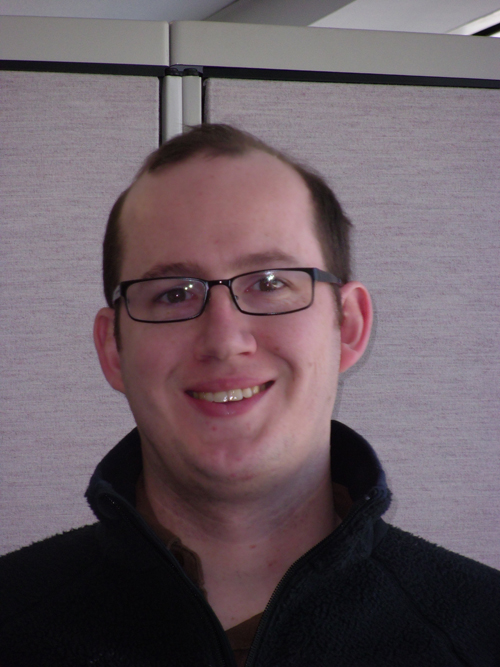 |
| IACS Graduate Student Bryan Sundahl |
A hearty welcome goes out to graduate student Bryan Sundahl who has recently joined the Institute for Advanced Computational Science. Having just started this spring semester, Bryan is pursuing his PhD in the Applied Mathematics and Statistics Department.
What attracted him to science? Bryan's grandfather was a physicist, but Bryan never had a chance to meet him. His parents are both Silicon Valley transplants and neither of his siblings is studying science, but Bryan “was always interested in how and why things work, and science supplied the best answers to those questions.” He received a BS in chemistry and a BS in math from the University of Texas at Austin. His MS is in Chemistry from the University of Tennessee at Knoxville, which is where he met IACS Director Robert Harrison. After finishing his master’s degree, Bryan followed Director Harrison to SBU and is now enrolled as a PhD graduate student.
According to Bryan, “Robert is the ‘mad’ genius behind MADNESS,” which is the software package that IACS Director Harrison created and that Bryan uses for his research. MADNESS is an acronym for Multiresolution Adaptive Numerical Environment for Scientific Simulation. “I’m trying to add response properties into MADNESS for quantum chemical calculations. I’m writing code to generate response properties that could be used, for example, to predict materials’ properties for next-generation solar cell and light harvester components.”
|
What is your favorite |
Although a scientist at heart, Bryan is also a musician, gamer and avid sci fi reader. He is teaching himself guitar, however the violin was his instrument of choice throughout his school years. “I play on my Great Uncle’s violin which was made in America about 150 years ago. It recently ‘melted’ when the AC in my parents' home went out, but it was just repaired and I plan to start playing again.”
On moving from Tennessee to New York, Bryan says he is enjoying the snow, “although it can leave now.” He also finds SBU graduate students are surprisingly willing to talk shop even if their backgrounds are dissimilar. “My housemates are willing to learn about things outside their comfort zone. When I talk about what I do, they can either relate it to what they do or they are genuinely interested in learning more about what I do."
Future plans for Bryan center on trying to move back to the Austin area, specifically to work at TACC, the Texas Advanced Computing Center. He plans on finishing his PhD in about 2 and a half years, at which time he says it would be ideal “to be able to continue my research through a joint appointment with TACC and the University of Texas at Austin. I’m not opposed to industry, but academia seems a better fit for me.”
When asked if he had any advice for other students considering graduate study, he said, “Make sure you end up doing something you can give 12 hours a day to for 5 or 6 years followed by another 40-50 years.” He enjoys computational science because “you always use the same tools, but the problems change. There is a lot of overlap at this level of detail across chemistry, physics, math and computational science. It’s not hard to shift the focus of what you are doing to another area of science.”
The Institute for Advanced Computational Science engages faculty, students and postdocs from a wide variety of academic backgrounds, all of whom have research interests that involve the use of high-performance and data-intensive computing. To find out more about IACS and the schedule of events, see http://iacs.stonybrook.edu/.